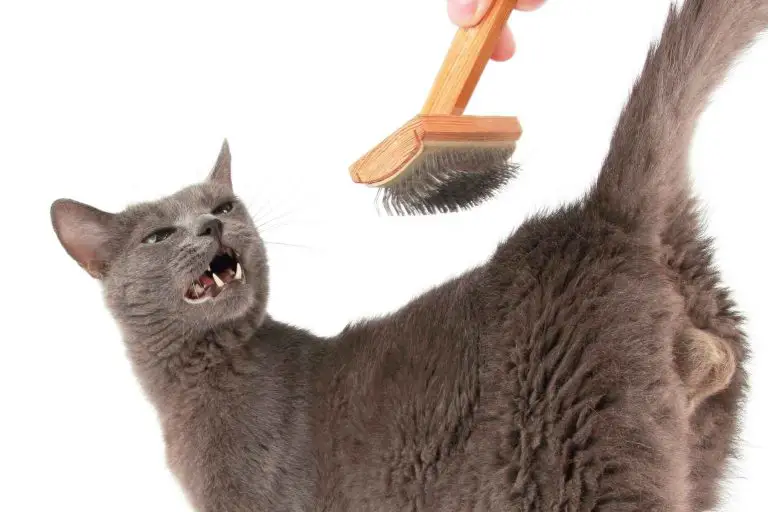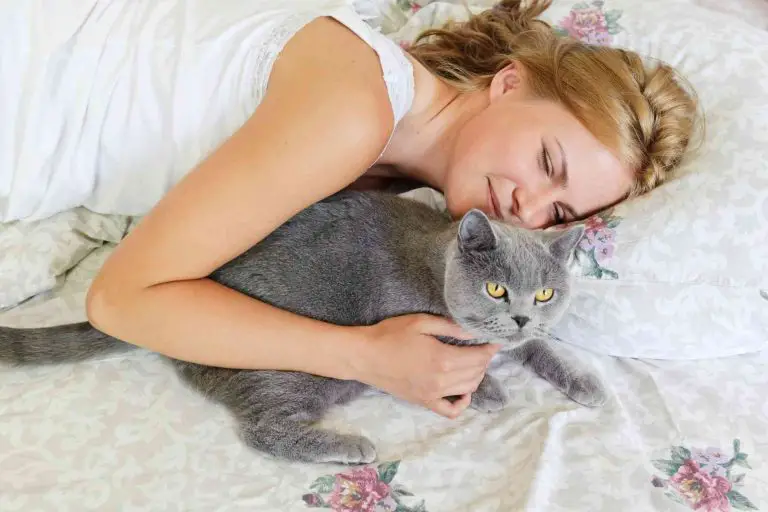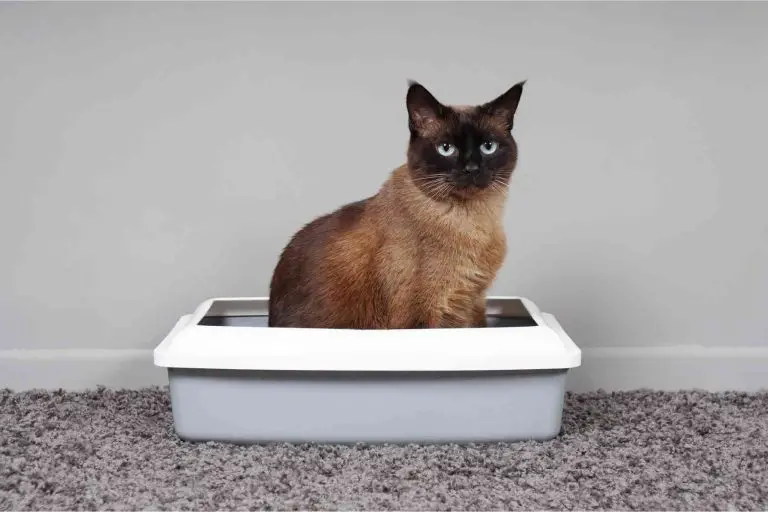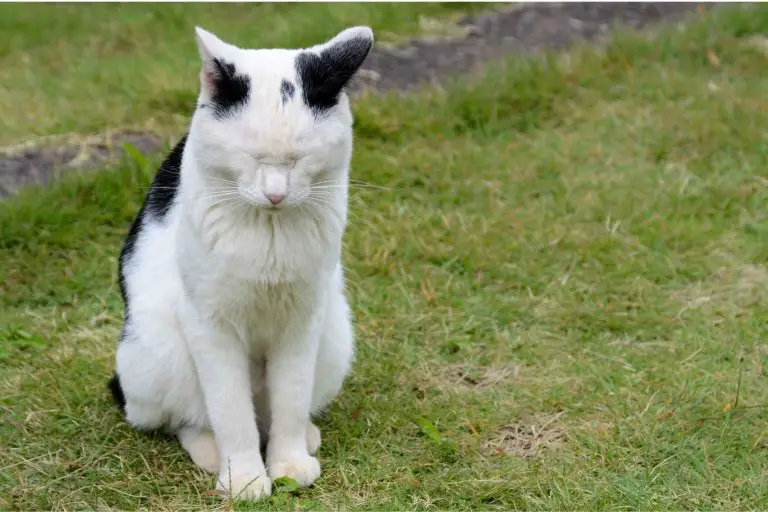Can Cats Catch Colds?

Seeing your beloved pet sick or hurt is probably one of the worst parts of pet ownership. We do everything in our power to make sure they are healthy and happy. But sometimes, things are out of our control.
If you’ve noticed that your cat is sneezing or has watery eyes, you may be wondering, can cats catch colds?
Cats can catch colds just as we do. Thankfully, our cats can’t pass their cold to us and vice versa, but they can certainly give it to other cats.
This article will go into detail about cat colds and other respiratory troubles that can plague them. I will also talk about the symptoms you can look out for, how to treat them, and when to visit your veterinarian.
Can Cats Catch Colds?
At first, you may notice a bit of a runny nose or some sneezing in your cat. Or perhaps her eyes seem to water, and she just looks like she isn’t quite feeling herself.
All of the above are common signs of a cold or an upper respiratory infection (URI), which is generally how colds are referred to in animals.
Like the common cold, several strains of the virus can cause your cat to feel unwell. Some of them are more contagious than others.
For the most part, a healthy cat’s immune system does a pretty good job of taking care of a cold. But there are times when it may get worse and warrant a trip to the veterinarian.
How Exactly Does a Cat Catch a Cold?
Most upper respiratory infections in cats are caused by a virus or bacterial infection. Sometimes, just as we can get sinus infections on top of colds, cats can get an infection on top of their virus.
Two particular viruses are commonly found in cats.
Calicivirus
Calicivirus presents with the typical symptoms of an upper respiratory infection, such as sneezing, congestion, and discharge from the eyes. Some cats with calicivirus can develop sores on the tongue or lips and will drool.
Calicivirus will also cause your cat to feel generally unwell, have lethargy, fever, and no desire to eat or drink.
Rhinotracheitis
Rhinotracheitis is an infection caused by the feline herpesvirus type-1. The virus is very specific to cats, causing the common signs of a URI, as well as swelling of the tissues around the eyes.
How Do Colds Spread?
These viruses, as with most, are typically airborne, but they can also spread through water. Often if a sick cat is in close contact with other cats, the virus can spread, and it can also spread if they share drinking water.
Cats in a boarding kennel or shelter are at risk of catching colds. But cats who live at home indoors can be at risk as well if they are exposed to viruses from other cats.
You can also spread it if you have been loving on a sick cat, and then you touch your own cat before thoroughly washing your hands.
Are There Other Ways a Cat Can Catch a Cold?
Other than spreading to other cats, viruses can also be caused by other things.
Poor Ventilation in the Home
Having poor air quality can contribute to or cause respiratory issues in cats and us—especially humidity, which can cause mold to grow. Even in colder weather, poor ventilation can cause excessive moisture due to activities in the home, such as cooking or bathing.
Poor Immune System
Cats with a poor immune system are also at an increased risk of a URI. Asthma, allergies, kidney disease, or even being under a lot of stress can contribute to a cold.
Can My Cat and I Pass a Cold to One Another?
There is no chance of you passing a cold to your cat, as most viruses affecting cats are very specific to the species and usually can’t survive in another host.
There have been a few proven cases of cats catching Covid 19 from humans, but they were reported to recover quickly with very few symptoms. Cats catching Covid from humans is extremely rare.
What Symptoms Should I Look for?
Generally speaking, you can expect your cat to have several of the same symptoms that we have.
- Congestion
- Sneezing
- Runny eyes
- Runny nose
- Lethargy
- No interest in food
- Cough
- Fever
- Enlarged lymph nodes
- Ulcers in and around the mouth
What Can I do to Treat her Symptoms?
If you suspect that your cat may be suffering from a cold, there are some things you can do to keep her comfortable. But you want to keep a close eye on her and take her to a veterinarian if she seems worse.
Clean Her Face
While she may hate you for it, take a damp, wet washcloth and remove any mucus or crusting around her nose or her eyes. Chances are, she will feel better afterward.
Let Her Rest
Give her a place to rest that is warm and quiet. Like us, when we aren’t feeling well, we don’t want to be disturbed.
Entice Her to Eat
She may not be interested in food, but you can try to entice her by warming it up just a little to increase the odor. Congestion in cats can often dull their sense of smell. You can offer water in a medicine dropper if she won’t drink.
Keep the Humidifier Running
A humidifier is great for holding moisture in the air and soothing her irritated throat and airway.
Be sure not to use any Vicks or anything containing camphor in your humidifier. It can be toxic to cats and dogs and should be avoided at all costs.
Never Give Medicine to Your Cat
You never want to give your cat any medication without talking to your veterinarian. Animals do not metabolize medicine the way humans do, and several drugs that are perfectly safe for humans can be toxic to cats.
Never, under any circumstances, should you give acetaminophen to your cat. It is toxic and can be fatal.
If you feel your cat is ill enough to warrant medication, she needs to be taken to a veterinarian.
Are There Things I Can Do to Prevent a Cold in My Cat?
Thankfully, by being proactive, there are things you can do to keep your cat’s immune system strong in the hopes of preventing a cold.
Keep Her Inside
Whether or not a cat should be strictly indoors seems to be a hot topic. But since this article is specifically about cats getting sick, the advice would be to make sure she is an indoor cat.
Domesticated cats have been kept indoors for decades. They tend to live longer and have few illnesses.
While outdoors, your cat runs the risk of running into other cats or animals with viruses.
If you insist she be able to go outdoors, putting her on a lease and letting her walk around your yard is fine.
Keep Her Vaccines Up to Date
As responsible pet owners, we must keep our cat’s vaccinations up to date.
Feline distemper vaccines not only protect her from distemper but also boost their immune symptoms against rhinotracheitis and calicivirus, the two most common viruses that cause respiratory infections.
While there is a chance she may still contract a cold, the vaccine will lessen her symptoms.
And, of course, keep her up to date on her rabies vaccine as it is legally required in most US states.
Feed Her a Well Balanced Diet
Feeding your cat a diet with proper nutrients is also an important boost to her immune system. Look for something packed with protein and probiotics.
Keep Your Home Clean
You most likely don’t want to live in filth, and neither does your cat. Keep your home clean and make sure you have good ventilation.
Keep the areas your cat frequents clean and wash her bedding regularly. Also, keep her litter box scooped daily.
When to Bring Her to the Veterinarian
If your cat’s symptoms seem to worsen or don’t get better after a day or two, it’s probably time for a trip to the veterinarian.
Kittens, pregnant cats, and older cats are more likely to have complications from a cold, and it’s important they are seen.
The following symptoms should be followed up with a vet appointment.
- Any sign of a cough
- An excessive amount of mucus coming from the eyes or nose
- Mucus coming from the eyes or nose
- Ulcers in and around the mouth that don’t seem to get better
- Feeling extremely lethargic or sad
If your cat experiences difficulty breathing at all, she needs to get to a vet ASAP. This is an emergency!
What Happens at a Vet Visit?
Your vet will do a thorough exam of your cat and perform any necessary tests or treatment. They may send you home with medication to help your cat get back on her feet.
Conclusion
Cats can get cold from one another, so it’s important to be aware of the symptoms. In some cases, they may need to visit a veterinarian to ensure they are feeling well again.



![Why Is My Cat Peeing in the House? [Cat Urinating Outside the Litter Box]](https://crittertips.com/wp-content/uploads/2023/07/why-is-my-cat-peeing-in-the-house-768x512.jpg)


